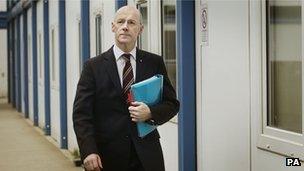Deficit, growth and prospects
- Published

Finance Secretary John Swinney says Scotland would be better placed running its own affairs
It's still not looking all that wonderful, is it? The economy, that is.
On the New York stock exchange, there may be happy smiles to greet a new record in the Dow. But there is another economy where, instead of simply making money, they make things and ends meet.
In that other world - the one, I suspect, most of my readers inhabit - it is still not great. Two publications today, one inadvertent, confirm that diagnosis.
Firstly, we have the Gers figures (Government Expenditure and Revenue for Scotland, external: not the Ibrox hopefuls). Secondly, we have a leaked Scottish government document outlining the future shape of the economy.
Let us consider Gers first. The document shows Scotland in deficit for the year in question, 2011/12, even including a per capita or a geographical share of North Sea oil revenue.
But there is more. The same document shows that the percentage deficit for the UK as a whole is greater than for Scotland alone when a geographical share of oil is included in the Scottish figures. That applies both to the current budget balance and the net fiscal balance, including capital expenditure.
Market forces
Remember, too, that the UK calculation upon which that comparison is based continues to include a 100% allocation of oil. Strip that out, post independence, and the figures would be more challenging still.
In short, on these calculations, it could be argued that if Scotland is in the red, the UK is in crimson.
Not, perhaps, an enormous and enduring comfort for everyday Scotland where ends are met. Especially as our largest market for sales is … the rest of the UK. But it prompts the argument that Scotland, alone and palely loitering with all that oil, would have a better balance, would be better off than at present.
Against that, Unionist politicians pose two arguments: that oil revenues are volatile and that the broader tax base of the UK permits greater resilience against short-term shocks such as sharp increases in unemployment and, therefore, benefits.
Against which, Nationalist politicians retort that Scotland has been misled for decades about the declining value of the North Sea - and that Scottish-driven economic growth could counter future challenges.
Which brings us to the leaked Scottish government document. Ministers say it was an early draft and subsequently overtaken.
However, even featuring those factors, it repays inspection. I would view it as, in part, an attempt by Finance Secretary John Swinney to remind his Cabinet colleagues of the need for productive, targeted public spending.
Forward thinking
Indeed, the document explicitly says, in conclusion, that ministers must focus upon policies which contribute to economic growth, rather than simply higher spending, in order to cope with continuing fiscal challenges.
This is, of course, relatively unremarkable in that the long-term stated Purpose of the government (with a definite capital P) is sustainable economic growth. The document restates that, in the context of forward assessments.
And those assessments? That Scotland's share of UK tax receipts is projected to fall from 9.6% in 2011/12 to 8.8% in 2016/17; that oil continues to be, by definition, volatile - declining in value up to 2016/17, although the outturn could be better than forecast; that the creation of a long-term oil fund would inevitably place pressure on existing expenditure, given the deficit; and that "the forward projections of the likely overall fiscal envelope provide a challenging context".
The document also notes that, by 2016/17, Scottish public finances should be back in a sustainable position. The conclusion? That times are tough - and that Scotland needs an economic strategy firmly based upon growth.
Which is prompting the following argument. Unionists say the SNP has hidden the true state of Scotland's finances in order to pursue the cause of independence. Nationalists say that Scotland faces an economic challenge - as does the wider UK. But that Scotland (see Gers) is better placed to meet that challenge.